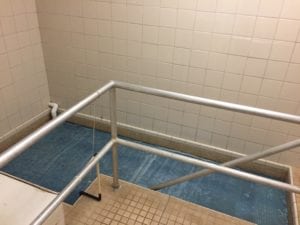
The interior of Louisville Community Mikvah sits on property owned by Anshei Sfard Congregation, which will likely be sold soon. (photo by Lee Chottiner )
As he walked around the building, Jacob Wishnia pointed out all the features of the Louisville Community Mikvah.
Outside the windowless, blond brick structure, there is a concrete cistern to catch rainwater and channel it to the ritual bath – living water as prescribed by Halachah. There’s also an interior catch basin.
Inside the utility room are the furnace, wiring and water heaters for the bath and building, all of which have been upgraded in the past eight years. Even the roof is new.
In the foyer of the air-conditioned facility, a beautiful mosaic by Dr. Harold Berg greets the users. A vanity with toiletries is available; so is a bathtub where users wash off before immersion.
All in all, it’s a clean, well-kept mikvah.
And unless something unexpected happens, a new one will be needed.
A mikvah is a bath used for ritual immersion. Halachically, women use it to achieve ritual purity following menstruation or childbirth. Men also use it for purification.
While the mikvah itself is owned and operated by the Louisville Vaad HaKashruth, it sits on ground owned by Congregation Anshei Sfard, the city’s Orthodox congregation.
Members of Anshei Sfard have made no secret of their interest in selling the building. When the deal is finally done, it will likely mean that the Vaad must find a new venue for the mikvah – an indispensable resource for a community that wants to attract and keep observant Jews.
“The Vaad’s mission is to provide and maintain a mikvah for Louisville,” said Wishnia, Vaad vice president and chair of the mikvah committee. “That is in our mission statement.”
Preferring not to wait until an eventual sale is final, the Vaad is acting now. It is establishing a committee to review its options for a new mikvah, and it is asking lay leaders, rabbis, cantors – anyone who is interested – to be part of the process.
The Mikvah committee will meet for the first time Thursday, July 27, 7 p.m., in the Senior Lounge at The J.
Members of the Vaad board have already been named to the panel, including Wishnia, Vaad President Jack Czerkiewicz, Sharon Stone, Myrle Davis, Adele Pearlman, Steven Goldstein, Sheila Lynch, Goldie Litvin, and Rabbis Avrahom Litvin, Chaim Litvin, Shmuly Litvin and Simcha.
Wishnia also sent a letter to the Board of Rabbis and Cantors, asking its members be part of the process.
He said he wants to encourage a “discussion” with the community.
It has other uses, too.
“While I teach about and encourage women to use the mikvah for its traditional monthly purpose, I believe that the most important function that the Louisville Mikvah has served over the past few years is to welcome converts into the Jewish faith and people,” said Rabbi Michael Wolk of Keneseth Israel Congregation. “For men and women, the final step0 of the conversion process is immersion in the mikvah after an intense period of study and Brit Milah for men.
So a mikvah plays several roles in the life of a Jewish community, but it’s not free.
While the Vaad has no rent, it does pay $2,100 a year to Anshei Sfard for utilities. There also are monthly charges to clean and change the water, clean the building itself, and toiletries and towels.
To support the facility, the Vaad suggests an $18 donation from each visitor who uses the facility. (A donation box is affixed to the wall next to the mosaic.), Three congregations – Keneseth Israel, Adath Jeshurun and Anshei Sfard – pay $1,500 per year to the Vaad, part of which covers mikvah use by their members.
“Right now, the mikvah is pretty much running itself,” Vaad President Czerkiewicz said.
It’s not clear how, or if, expenses would be affected by moving to a new mikvah. There would probably be construction involved, though Wishnia hopes many of the utilities, including the furnace and water heaters, could be disassembled and taken to the new facility.
Also, while men and women currently use the same mikvah, Wishnia said there are some who would prefer separate baths for each sex as well as a keilim mikvah – a smaller bath used to purify kitchen utensils, cutlery and bowls.
“Some would like that,” Wishnia said. “It depends on money.”
Along those lines, the Vaad is seeking outside assistance.
It has applied to Mikvah USA, an organization that supports the establishment and rebuilding of mikvahs in communities across America. Among the services it provides are grants to complete mikvah projects, halachic and technical guidance, inspections, education and training.
They can also help with the design, Czerkiewicz said, including handicapped accessibility.
The application to Mikvah USA was general and did not include a grant request, said Rabbi Snaid of Anshei Sfard, who filled it out.
“It was just a way to get to speak to them, to find out what they offer and what needs to be done,” he said.
While the Mikvah Committee has yet to meet, Czerkiewizc knows one thing for sure: A no-build option won’t be considered.
“We definitely need one in the city,” he said.



